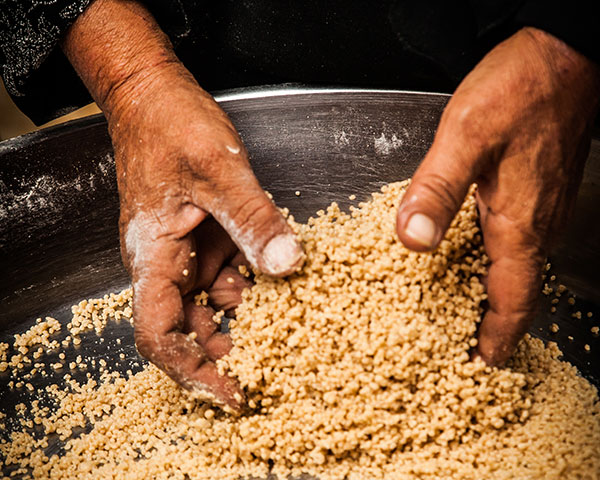Pale yellow pearls of maftoul served up alongside braised lamb, slow-roasted chickpeas or baked aubergines with slurps of yoghurt may be a slightly more unusual accompaniment for some.
But this traditional Palestinian grain has a rich traditional and cultural history as well as very current ties to the financial and cultural sustainability of women farmers in the West Bank area.
Essentially sun-dried bulgur wheat, maftoul is made after the wheat harvest is brought in, before being dried in Palestine’s abundant sunshine, and ‘cracked and rolled’ in an artisan process passed down by grandmothers and other relatives to today’s female community leaders.

Image Nick Pickard.
Tradition and heritage
“As a Palestinian woman, I transfer these traditions to the next generation of women in order to preserve Palestinian culture and connect them with their heritage, and also to offer them the chance to be future leaders in the community,” explains Bassema Barahmeh, the coordinator of a women’s cooperative in Anza village.
Located 450 metres above sea level, south-west of Jenin in the West Bank, Anza is one of the most scenic villages in Palestine and the cooperative is known for its production of organic maftoul and olive oil, as well as the value it places on education for women and girls.
The cooperative produces around three tonnes of maftoul each year, processing it during the hot summer months ready for export to the UK and other countries from September. It’s a valuable source of empowerment, income and independence for Barahmeh and the other women: “I have a say in this household and the community. I am a breadwinner and can make my own decisions,” she says.

“Even in my own household, I don’t have to wait for my husband’s permission, but can just go ahead and do things for myself. It has given me independence and raised my morale. My life has transformed,” says Barahmeh, who in addition to farming, is a board member of the Palestine Fair Trade Association, village council member and mother of four.
As well as the skilled art of rolling maftoul, she produces organic Fairtrade olive oil, shells almonds, blends za’atar, and bakes pastries with other women to sell at local school canteens.
In Palestine, there has been a tradition of exporting the most valuable crops, such as maftoul, to international markets, while Palestinians would instead eat rice, often imported, with their own meals. With a move towards greater self-sufficiency and more interest in their own traditional varieties of crop, maftoul is once more taking its place on the table in recipes such as the tradtional Mujaddara.
Telling the story of traditional Palestinian crops is also a poignant way of reaching international audiences, from which they are otherwise barred due to the Israeli occupation, and as such trade and export of such Fairtrade products, where the premium is reinvested back into training or tools, provides income but also a vital lifeline to the outside world.

Climate resilience in an occupied land
Cultivated for more than 4,000 years, wheat is indigenous to Syria, Jordon, Lebanon, Palestine, and Egypt. In Palestine, it was grown by farmers thousands of years ago in the ‘Marj Ibn Amer’ area, or what is locally known as the breadbasket of Palestine, located north of Jenin and extending to Nazareth.
Nowadays, wheat is still grown in a traditional organic system, which is more often down to the fact that Palestinian farmers are unable to access any fertiliser or chemicals due to the restrictions on trade and movement of goods, as well as people, because of the enforced segregation between Israel and Palestine.

Maftoul and wheat growing also have a vital link to the climate resilience of these small farmers thanks to investment in heritage and ‘landrace’ varieties of wheat that are rain-fed and drought resistant, by Canaan Fair Trade, a co-operative that buys from farmers and sells to UK social enterprise and Palestinian food supplier, Zaytoun.
These self-sufficient wheat varieties are hugely important to farmers in a land where water resources are controlled by an external power, and climate resilience is subsequently limited. Commodified wheat varieties are being increasingly promoted in Palestine, though, with farmers under pressure from wheat agents, and there are fears around the future of the heritage varieties.
Despite Covid-19 restricting movement, the wheat harvest was able to take place this summer across the West Bank and quality was good, while women including Barahmeh are currently rolling this season’s maftoul.
While supply chains and societies have been disrupted worldwide because of the pandemic, for Palestinian farmers already working among lockdown conditions of their own, the arrival of their precious maftoul grains with international consumers remains an achievement in food security and financial sustainability.












0 Comments